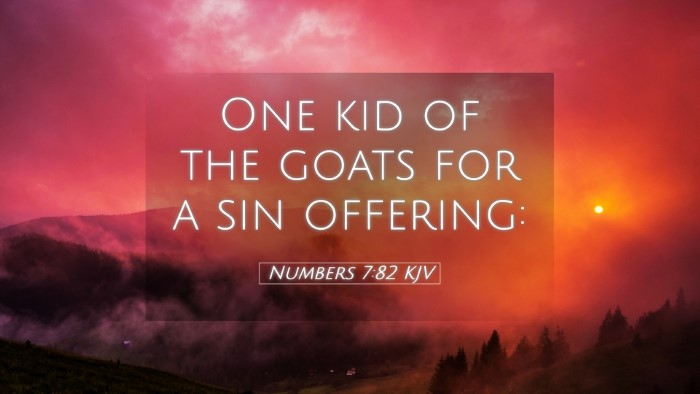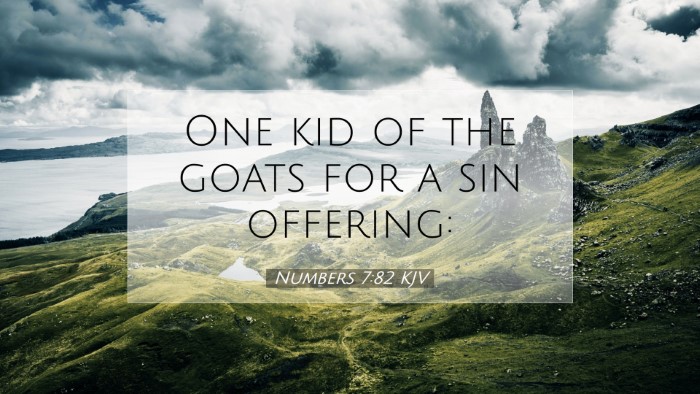Commentary on Numbers 7:82
Numbers 7:82 states, "And the twelve oxen were for the twelve princes of Israel: each one was for a particular prince." (Numbers 7:82, KJV)
Contextual Overview
The Book of Numbers outlines the various events in the wilderness journey of the Israelites. In chapter 7, we find a detailed account of the offerings made by the leaders of the tribes following the dedication of the altar. This chapter focuses on the generosity and active participation of the leaders, notably the princes, in facilitating the worship and service of God. Numbers 7:82 specifically highlights the offerings made to God and their significance to the community.
Insight from Matthew Henry
Matthew Henry emphasizes that the offerings by the princes were not just gifts, but representations of their dedication and service to God’s work among His people. The twelve oxen symbolize strength, vigor, and the sacrifices made on behalf of the tribes. Henry illustrates how these offerings reflect the unity and commitment of the tribes towards the collective worship of God, noting that each prince played a crucial role in leading and representing their respective tribe before the Lord.
Perspective from Albert Barnes
Albert Barnes contributes to the discussion by discussing the symbolism embedded within the sacrifices. He notes that the oxen can symbolize the labor and effort that the leaders must invest in their roles. Each prince’s offering underlines the idea that true leadership in God’s kingdom involves sacrifice and service. Furthermore, Barnes remarks on the significance of the number twelve, which stands for completeness and divine order, reflecting how God deals with His people collectively, as a nation yet distinct in their tribal identities.
Reflections from Adam Clarke
Adam Clarke delves into the historical and theological implications of the offerings. He states that these acts of sacrifice symbolize the expected devotion of the leaders towards God and the community. Clarke posits that these gifts were not merely ceremonial but served as a bridge between God and the people. He expands on the understanding that the collective sacrifices were a precursor to the ultimate sacrifice of Christ, foreshadowing the need for a representative mediator. The act of giving by each prince also points to the importance of individual contributions in communal worship and service.
Theological Significance
This verse encompasses profound theological nuances beneficial for pastors and theologians alike. The twelve oxen offered by the princes signify several concepts:
- Representation: Each offering symbolizes the role of leaders within the community, showing that they are to lead by example in devotion to God.
- Unity in Diversity: The offerings highlight the variety within the community of Israel while emphasizing their unified worship of God.
- Commitment to Sacrifice: The act of giving signifies the importance of personal and communal sacrifices in the life of faith.
Practical Applications
For pastors and leaders, Numbers 7:82 serves as a poignant reminder of the importance of their roles in church communities. Here are some practical applications:
- Modeling Generosity: Leaders are called to set examples by actively participating in sacrificial giving.
- Encouraging Community Involvement: Leaders should promote a culture where every member feels valued and encouraged to contribute in worship and service.
- Building a Strong Foundation: Sacrifices and offerings should reflect an understanding and acknowledgment of God’s provision and faithfulness.
Conclusion
Numbers 7:82 is a rich verse brimming with insights regarding leadership, community, and sacrificial worship. Through the combined reflections of Matthew Henry, Albert Barnes, and Adam Clarke, we unravel the layers of meaning behind the sacrifices made by the princes of Israel. For those involved in biblical studies, this verse emphasizes the integral relationship between reverence, leadership, and communal identity in God’s covenant community.


